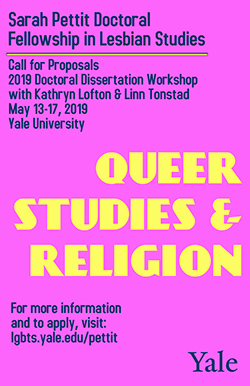|
||||||||
Call for Proposals
|
||||||||
 Click to view detail
|
Yale LGBT Studies is pleased to announce that the Sarah Pettit Doctoral Fellowship in Lesbian Studies at Yale University is welcoming applications for a biennial dissertation-writing workshop for a cohort of doctoral fellows. The 2019 Yale Pettit Doctoral Fellowship Workshop will take place May 13-17, 2019 in New Haven, CT and will focus on scholarship at the intersection of queer studies, LGBT studies, and religious studies.
Fellows will convene for a three-day intensive workshop at Yale University where they will present and engage with each other’s work. They will meet with and receive feedback from the workshop’s two faculty mentors, Professors Kathryn Lofton and Linn Tonstad. Following the three-day workshop, fellows will stay in New Haven for an additional two days to write and to take advantage of Yale University libraries and resources. Selected fellows will receive small stipends and travel funding in addition to room and board for the week of the workshop. Application deadline is Friday, February 15, 2019.
2019 Pettit Fellowship Description
We welcome applicants from the humanities, social sciences, performing and fine arts, and beyond, to share their emerging scholarship on queer studies and religion. We are interested in applicants who will teach this gathered community about the disciplinary limits they perceive through their research and how they supersede those limits (or are constrained by those methods). We have no central object that organizes us other than the hope to discover, through conversation and critical reading, sharper arguments for our shared scholarship. Within the frame of queer and feminist studies, a great deal of incisive scholarship has suggested the value of ambivalence as an analytic entryway to the conflicted modes of queer political, affective, and conceptual survival. Within religious and theological studies scholars have repeatedly, perhaps excessively, returned to complexity as a concluding term of historical, sociological, or theoretical valuation. We are excited to imagine interpretations beyond complicated ambivalence. How do we author scholarship at the intersection of queer studies, lesbian studies, and religious studies that does not summarize states of multiplicity but also argues for interpretive clarity? What would queer feminist criticism in the study of religion produce? What can the study of religion offer queer feminist critics? During the workshop we imagine discussing particular features of fellows’ scholarship as well as the factors (social, economic, and ideological) influencing the production of scholarship in the present time.
LGBTS

